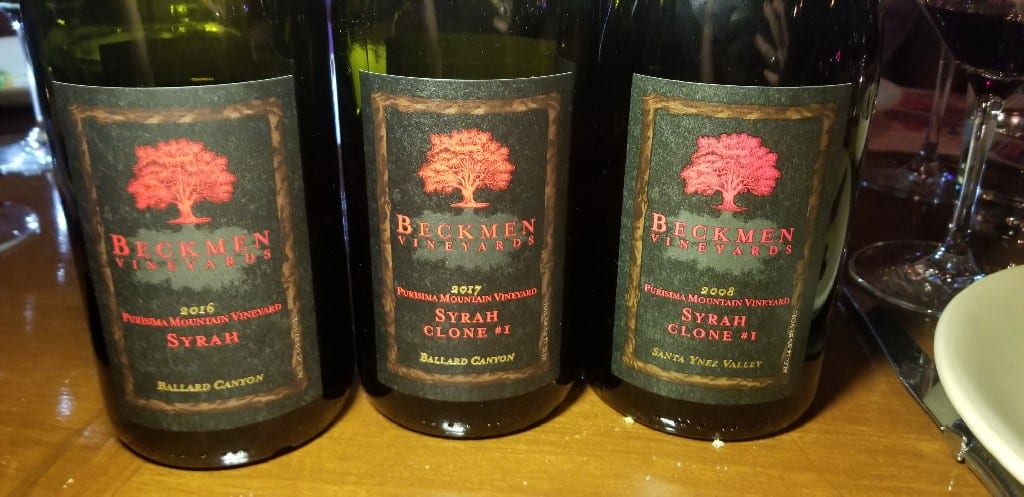
11 Jul Beckmen’s biodynamic farming in Santa Barbara County
I first met Steve Beckmen of Beckmen Vineyards almost 20 years ago. He was one of the first people I heard speak about biodynamic farming. Twenty years later, we sat down and tasted his wines. The maturity of the vineyards and the passion of Steve come through in the balance and complexity of the wines and you can read my story that I wrote in the Napa Valley Register below her.
When I first started in the wine business almost 20 years ago, I would take consumers on day trips from Los Angeles to the Santa Barbara wine country for a day of tasting and education. We would visit different wineries and the winemakers would meet with our group to share their stories.
One trip took us up to the top of Purisima Hills, now part of Ballard Canyon AVA. We were met by Steve Beckmen of Beckmen Vineyards whose family had purchased 365 acres of virgin land in the Purisima Hills in 1996. The family had planted 130 acres to Rhone varietals and by 2002, they were farming it biodynamically.
At the time, it was the early 2000s and biodynamic faming was a practice that consumers were just beginning to hear about. To explain the principles and benefits of biodynamic farming, I recall Steve scooping up dirt in his hands. He walked a few feet away to another vineyard and scooped up some dirt as well and then compared the two, showing us how alive the soil was that was biodynamically farmed.
I also recall Steve explaining some of the holistic practices of biodynamic farming. If you know any biodynamic farmers, you likely know how the ecosystem in the vineyard functions as a whole, with the idea to create a self-sustaining system. A range of animals, such as sheep and horses, live on the soil and fertilize it, creating a rich environment for the vines to grow. And, there are traditions to deal with pests that cause extensive damage in the vineyard, such as gophers.
As we stood at the top of the Purisima Mountain Vineyard in the mid-2000s, Steve told the story of how they capture the first gopher of the year and then kill and burn it, spreading the ashes over the vineyard. I will never forget how this story sent one of the guests on my trip running back to the bus in tears. It was rather funny as she had completely missed the point about why this is done and how it is part of the holistic approach to maintaining the ecosystem. She felt so badly for the gopher who is detrimental to the vineyards and yet likely never thought twice about killing a spider or using pesticides at home to feed her plants.
Sitting down with Steve recently, I recalled this memory and shared it with him. He explained how he believes in the homeopathic nature of biodynamic farming. And, by spreading the gopher ashes over the vineyard early in the season, it scares off other gophers throughout harvest.
This process is part of the ecosystem in the vineyard. For 25 years, Steve has been making wine in Santa Barbara County and as a biodynamic farmer, he feels the process gives the wine more energy, more clarity of expression and a sense of place.
I enjoyed this energy and clarity of expression as I tasted through some of the Beckmen Vineyards wines recently. We started with the Beckmen Vineyards 2017 Purisima Mountain Vineyard Viognier. There are only two acres of own-rooted Viognier planted on Purisima Mountain. Picked early, stainless steel fermented and aged in stainless steel and 40 percent old barrels, the wine has notes of crisp apple, lime, melon, apricot and jasmine flowers. The wine is balanced and textured with a long finish and lively acidity.
Beckmen started producing rosé in 1995 after visiting Provence, France. Steve cheated the first year, blending Cabernet Sauvignon and Sauvignon Blanc. As Purisima Mountain Vineyard came into its own, Steve dedicated a five-acre block to Grenache for rosé. The Beckmen Vineyards 2017 Purisima Mountain Vineyard Grenache Rosé has seven percent Syrah in it. A fan of Tavel wines, Steve wants to make a rosé that is rich and has depth but pulls back on color, soaking the Grenache on its skins for 6-24 hours and direct pressing the Syrah. The wine is stainless steel fermented and then aged in 40 percent stainless steel and 60 percent neutral barrels for five months. The rosé, with aromas of strawberry, cherry and topical fruits, is lively with great texture and a long finish with soft tannins on the tongue.
The Beckmen Vineyards 2016 Cuvee Le Bec is a blend of 46 percent Grenache, 39 percent Syrah, 8 percent Mourvedre and 7 percent Counoise. The fruit comes from both the Purisima Mountain Vineyard AVA and the Beckmen Estate Vineyards Santa Ynez Valley AVA, their 40-acre vineyard in Los Olivos. First made in 1997, Le Bec was the first blend by Beckmen Vineyards, who focus on single varietal wines. Steve was inspired by Australian wines which made him want to make a blend. The 2016 Le Bec has bright floral aromas as well as notes of bright red fruits and spice.
As a lover of Grenache, Steve has 40 acres planted. He has been making Grenache since 1995, and in 2003-2004, he started working with bush vines. The Beckmen Vineyards 2017 Santa Ynez Valley Grenache is made from fruit from both the Purisima Mountain Vineyard AVA and the Beckmen Estate Vineyards Santa Ynez Valley AVA. Aged for 10 months in three-year old and neutral French oak, the wine has aromas of strawberry, raspberry jam, violets and white pepper.
The Beckmen Vineyards 2017 Purisima Mountain Vineyard Grenache spends 18months in 25 percent new French oak Puncheon and 75 percent is 2-4-year-old French oak Puncheon. The wine has aromas of black raspberry, plum, cranberry, cherry, baking spices and white pepper.
The Syrah planted on Purisima Mountain Vineyard ranges from the bottom of the vineyard to a 450-foot elevation and 25 percent of the Syrah is own-rooted. The Beckmen Vineyards 2016 Purisima Mountain Vineyard Syrah is a blend of Syrah picked from all over the property.
Aged in 35 percent new and 64 percent lightly used French oak, the wine has aromas of blackberry, dark chocolate and vanilla. The wine is powerful and yet elegant. The Beckmen Vineyards 2017 Purisima Mountain Vineyard Syrah Clone #1 is made from a five-acre selection from the bottom of the vineyard. Spending 16 months in new and one-year old French oak, the wine has notes of blackberry, plum, leather, dark chocolate and pepper.
After 25 years producing wine in Santa Barbara County, the Beckmen vineyards are mature, and Steve has honed his craft to produce wines of balanced flavor and complexity and above all, finesse.
Read the original story in the Napa Valley Register.
Discover more from Please The Palate
Subscribe to get the latest posts sent to your email.





